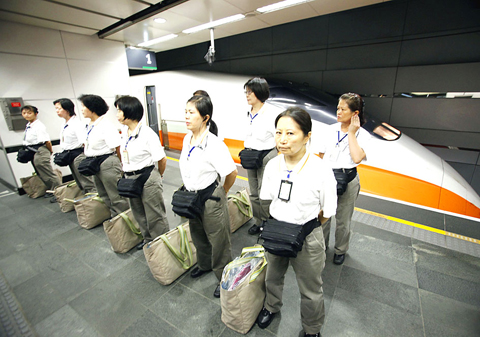Taiwan High Speed Rail Corp (THSRC, 台灣高鐵) chairwoman Nita Ing (殷琪) stepped down from her post yesterday and an ad hoc board meeting elected chief executive Ou Chin-der (歐晉德) to replace her.
Ing, 54, who founded THSRC in July 1998 after winning the nation’s first build-operate-transfer contract to construct the north-south high speed railway two years earlier, said she hoped her resignation could help reverse the company’s finances.
“My career means nothing if more government participation can help the company run smoothly and profitably,” Ing said through THSRC spokesman Ted Chia (賈先德).

PHOTO: NICKY LOH, REUTERS
Chia said Ing announced her decision to step down at the beginning of the board meeting and the board named Ou to the chairmanship under his capacity as the legal representative of the state-run China Aviation Development Foundation (航發會).
The reshuffle, which took effect immediately, ushers in a new era for THSRC, one in which the government will assume a dominant role in deciding the board lineup and management.
The government has a nearly 40 percent stake in the company. THSRC has accumulated more than NT$450 billion (US$13.8 billion) in debts and is seeking a syndicated loan worth NT$390 billion.
Neither Ing nor Ou showed up at the unscheduled press conference after the board meeting. Chia said Ing would remain a board member representing Continental Engineering Corp (大陸工程), one of THSRC’s five founding shareholders, while Ou would serve as both THSRC chairman and CEO.
Last night, however, the company said in a stock exchange filing that Ing would also step down from the board and Continental Engineering would nominate a successor soon.
Chia said the company would call an extraordinary shareholders’ meeting on Nov. 10 to elect a new board of directors and supervisors.
He declined to comment on reports that Ing resigned to ensure government support for the bank loan.
“The former chairperson made no mention of such pressure,” Chia said. “She did extend gratitude to all THSRC employees for helping realize the high speed rail project.”
Ou, 65, a civil engineer by training, will soon brief the media on how he plans to improve the company’s finances and operations, Chia said.
Ou joined the public service sector in the late 1980s and has worked for the national expressway engineering bureau, the public construction commission and the central government. In 1998, he was tapped by then-Taipei mayor Ma Ying-jeou (馬英九) to serve as deputy mayor. He retained his friendly ties to Ma and the Chinese Nationalist Party (KMT) after joining THSRC in 1996 at Ing’s invitation.
Ou has avoided reporters since news broke over the weekend that Ing would be stepping down. Premier Wu Den-yih (吳敦義) said on Sunday that Ing planned to resign.

Sweeping policy changes under US Secretary of Health and Human Services Robert F. Kennedy Jr are having a chilling effect on vaccine makers as anti-vaccine rhetoric has turned into concrete changes in inoculation schedules and recommendations, investors and executives said. The administration of US President Donald Trump has in the past year upended vaccine recommendations, with the country last month ending its longstanding guidance that all children receive inoculations against flu, hepatitis A and other diseases. The unprecedented changes have led to diminished vaccine usage, hurt the investment case for some biotechs, and created a drag that would likely dent revenues and

Global semiconductor stocks advanced yesterday, as comments by Nvidia Corp chief executive officer Jensen Huang (黃仁勳) at Davos, Switzerland, helped reinforce investor enthusiasm for artificial intelligence (AI). Samsung Electronics Co gained as much as 5 percent to an all-time high, helping drive South Korea’s benchmark KOSPI above 5,000 for the first time. That came after the Philadelphia Semiconductor Index rose more than 3 percent to a fresh record on Wednesday, with a boost from Nvidia. The gains came amid broad risk-on trade after US President Donald Trump withdrew his threat of tariffs on some European nations over backing for Greenland. Huang further

CULPRITS: Factors that affected the slip included falling global crude oil prices, wait-and-see consumer attitudes due to US tariffs and a different Lunar New Year holiday schedule Taiwan’s retail sales ended a nine-year growth streak last year, slipping 0.2 percent from a year earlier as uncertainty over US tariff policies affected demand for durable goods, data released on Friday by the Ministry of Economic Affairs showed. Last year’s retail sales totaled NT$4.84 trillion (US$153.27 billion), down about NT$9.5 billion, or 0.2 percent, from 2024. Despite the decline, the figure was still the second-highest annual sales total on record. Ministry statistics department deputy head Chen Yu-fang (陳玉芳) said sales of cars, motorcycles and related products, which accounted for 17.4 percent of total retail rales last year, fell NT$68.1 billion, or

HSBC Bank Taiwan Ltd (匯豐台灣商銀) and the Taiwan High Prosecutors Office recently signed a memorandum of understanding (MOU) to enhance cooperation on the suspicious transaction analysis mechanism. This landmark agreement makes HSBC the first foreign bank in Taiwan to establish such a partnership with the High Prosecutors Office, underscoring its commitment to active anti-fraud initiatives, financial inclusion, and the “Treating Customers Fairly” principle. Through this deep public-private collaboration, both parties aim to co-create a secure financial ecosystem via early warning detection and precise fraud prevention technologies. At the signing ceremony, HSBC Taiwan CEO and head of banking Adam Chen (陳志堅)